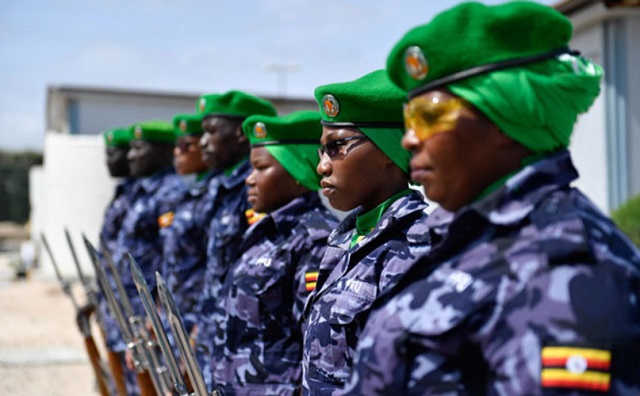
Somalia army not accepted
Many experts involved in the rebuilding of Somalia say troop reduction requires caution and not a project whose plug can be pulled anytime.
“The Somali National Army is not yet acceptable nationally, because it is still bearing the historical background of how it was created,” says a highly placed military source who preferred anonymity while commenting on the matter.
The Somali army is an assemblage of clan factions meaning that for every one intervening in Somalia, they need to find a way of working around these factions either by appeasing them or not pushing too hard to avoid confrontations.
The source who has extensively dealt with AMISOM officers and politicians in Somalia says Somalia’s problem is political and adds that it has been worsened by the deteriorating relations between the Federal government and the federal regions. Somalia has a federal system of government.
“One time we had a meeting and there were six ‘presidents’ from the other federal states and each one of them was trying to assert their power and authority and there was just confusion,” he told The Independent.
He says that federalism in Somalia is a big problem because of the contestations it is causing. “You have regions which are struggling to make strong clan militias both militarily and police-wise so that they can command regions and have more autonomy including on foreign policy.”
He adds that the regions look at a strong government at the centre as a problem while the centre also looks at the regions with fear and would like to suppress them. “That is the dilemma in which we are,” he says.
A presidential election due to take place on Aug. 24, in Jubaland, a federal state, already has Somalia’s international partners on edge. James Swan, Special Representative of the Secretary-General for Somalia and Head of the United Nations Assistance Mission in Somalia (UNSOM) wrote to Jubaland’s electoral body saying there should be enhanced security arrangements by AMISOM in Jubaland for the sake of a peaceful election.
At the centre of these contestations between the regions and the central government are the clans. They have frustrated AMISOM’s attempt to create a national army. Everyone with authority is trying to build their own army based on their clan.
“When we say let us train officers, who will give you the right officer cadets?” an official involved told The Independent.
He says the clan politics interferes with the workings of institutions like parliament and other government agencies. Building of an integrated army, which is one of the foundations of a state, remains a big problem for forces like the UPDF.
“There is a lot of interference from the federal states which is clan oriented,” he says, “Until when we have built a national army that is able to hold the ground and defend the interest of the people, we will not be able to make any progress.”
In spite of this, the official says, the UPDF is proud because about 5000 troops have been trained by the AMISOM force.
UPDF role in clan rivalry
In an interview with The Independent in December 2017 in Mogadishu, then UPDF contingent commander, Brig. Kayanja Muhanga, spoke about the clan problem in Somalia and how the UPDF was trying to help matters. “Any force that comes here needs to first understand the clan dynamics in Somalia,” he said.
“You have to be a friend to all clans because there is heavy rivalry between them.” Sometimes the clan makes alliances with Al Shabaab when a force is simply intent on capturing local territories without offering anything to the local population. “The clans and Al Shabaab will say ‘we have a common enemy,” Muhanga explained.
The clan system is Somalia’s model of democracy and, depending on whom you speak to; it either works well for the country or harms it. Members of Parliament are elected to represent their clans. The clans are involved in lobbying for positions in government, hold negotiations for economic power, and are routinely defending their territory from intruders- with guns.
“Sometimes when you hear an attack in Mogadishu or anywhere in Somalia, it is an attack to send a message to the government for a grievance they are holding; it could be an appointment that was not honoured or even a dispute the clan wants resolved,” Muhanga told The Independent.
Muhanga said the clan rivalry was a source of instability and as a result, the UPDF was involved in mediation of clan conflicts. Since the clan rivalry will not end anytime soon, the UPDF may not have many options on its Somalia mission other than staying.
Over almost two decades of battles, and since 2007, AMISOM as a force has successfully pushed Al Shabaab, the militant Islamist group 140km from Mogadishu.
But UPDF and other forces in AMISOM never rest on their laurels thinking they have defeated Al Shabaab because the terrorist organisation is an ever present threat. “The Al Shabaab comes in the middle of those cracks between the central government and the regions. They want to take power because they look at the Somali government as one that is foreign imposed,” the source said.
This sentiment is strong because some observers in and outside Somalia look at President Mohamed Abdullahi Mohamed popularly known as Farmajo as one who has struggled to be a unifying figure in Somalia because of his connection to the U.S. He spent many years in the US where he served in administrative roles.
A few days ago, Farmajo renounced his U.S. citizenship in a move interpreted as a way of solidifying his Somali roots.
‘Uganda should be neutral’
But the UPDF involvement in AMISOM has critics even in its own backyard.
Hassan Kaps Fungaroo, the MP for Obongi County, says UPDF can never achieve peace in Somalia even if the AMISOM mission goes on ad infinitum.
“You are not going to bring peace when you are fighting wars for other superpowers,” Fungaroo told The Independent in an interview, “Whereas it was a good idea for us to go to Somalia in the spirit of Pan Africanism, we did not go there with the position of neutrality.”
Fungaroo was one of the first voices to speak out on the deployment of UPDF in Somalia in 2007. At the time, Fungaroo was the shadow minister for defence and he recalls how he and former Makindye East MP Hussein Kyanjo opposed the mission.
Fungaroo says it would have been better for President Museveni to enter Somalia as a mediator between the fighting groups – but says “it is now too late”.
“Uganda is an ally of the government of Somalia,” he says, adding that the problem of partiality intensified when Ethiopia joined AMISOM.
“Ethiopia was already fighting wars in Somalia, AMISOM cannot bring peace.”
Fungaroo’s concern has been raised before. In AMISOM’s strategic command structure, Somalia is divided into five sectors among the Troop Contributing Countries (TCCs) and Uganda occupies Sector 1- the most volatile area which contains Mogadishu and surrounding areas including the highly productive Lower Shabelle region. Sector 2 is occupied by Kenya, Ethiopia is in Sector 3, Djibouti is in 4 and Burundi in 5.
Ethiopia was placed in Sector 3, quite a distance from Mogadishu because of its bitter history with Somalia basing on past invasions. The idea by AMISOM commanders was not to inflame tensions. So the area occupied by Ethiopia is not as volatile as Sector 1 occupied by Ugandan troops.
Being the first country to deploy in Somalia, Uganda naturally found itself in Sector 1 which was Ground Zero of the war against Al Shabaab.
Since then, Uganda and all the Horn of Africa countries has for decades been sucked into the complex Somalia situation.
The conflict has also has sucked in and dominated the strategic planning for the region by international agencies. That is why Mbeki was in Kampala in July. He told Museveni that his panel is on the mission of addressing the challenges of the integration of the Horn of Africa and looking into the region’s security, economic and political challenges. Mbeki had already met the leaders of Kenya and Somalia.
But when they asked him to comment on the security, economic and political issues afflicting the Horn of Africa, Museveni declined and instead offered to write to Mbeki’s panel.
“If you think about ideology of identity against ideology of interests, then you are off course,” he said; at once referencing the clan problem in Somalia and what he sees as the solution.
When asked to comment, the UPDF Spokesperson; Brig. Richard Karemire, said the modalities of Uganda’s troop withdrawal are not yet worked out.
“Since the Resolution was passed by the UN Security Council, the Military Operations Coordination Committee (MOCC) has not come up with a formal position on how many troops each country should send back or which country should be the first to send back troops.” In other words, the troops are not going anywhere – for now.
 The Independent Uganda: You get the Truth we Pay the Price
The Independent Uganda: You get the Truth we Pay the Price




Sometimes it seems they are feeling for us more than we feel for ourselves. If they care about true recovery of Somalia, 12 years is more than enough. No amount of money is worth our country’s existence. What we see is a clear breach of African tradition and spirit of brotherhood. These foreign forces openly collude with the terror groups. They sell arms and other valuables to them. We have evidence, Ugandan forces doing that. They commit crimes like rape. Others openly engage charcoal business with terrorists. Yet they claim to be keeping peace in our country. Who are we kidding? Do they think we are stupid? I mean as stupid as we are that we had civil war, not all of us are stupid. Some of us know what Amisom is doing to Somalia is not right and we yield for consequences. We know those who behaved well, those who take advantage over us, those who capitalize on our misfortune. The idea of seeking to stay with forever is an indication that these forces and their countries are money-oriented. The intention was never to help Somalia. Rather to keep our future in the dark. We know. We are not here to forget. Everyone will receive an equal measure of what they did to us when we were weak. It is better they accept to go because we now know their mission.